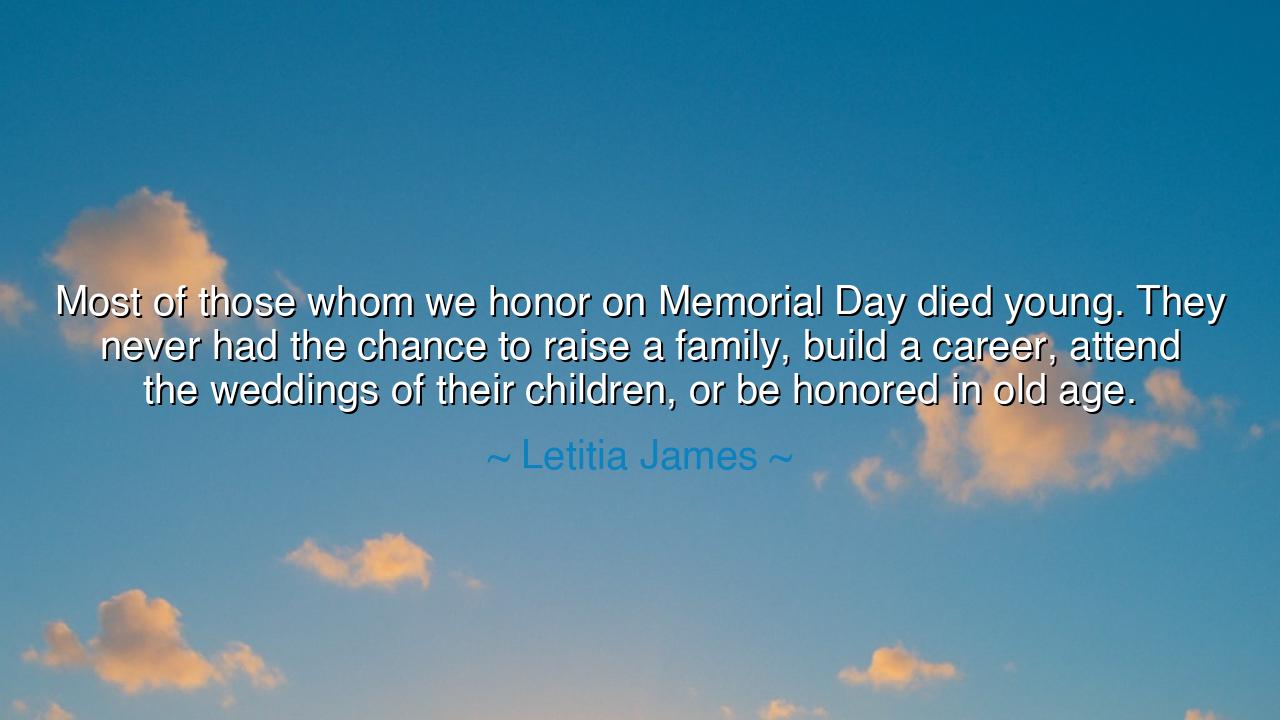
Most of those whom we honor on Memorial Day died young. They
Most of those whom we honor on Memorial Day died young. They never had the chance to raise a family, build a career, attend the weddings of their children, or be honored in old age.






In the great tapestry of life, there are moments of profound sacrifice, when individuals lay down their futures not for their own glory, but for the freedom and safety of others. On Memorial Day, we remember those who gave their lives in service to their country. Letitia James, in her poignant words, reminds us of the harsh reality that "Most of those whom we honor on Memorial Day died young. They never had the chance to raise a family, build a career, attend the weddings of their children, or be honored in old age." These words resonate deeply, for they speak not only of the loss of life, but of the dreams and potential unrealized—the future forgone in the name of duty.
The ancients understood the cost of sacrifice, and they often immortalized the heroes who gave their lives in service to their communities or their countries. In the epic poetry of Homer, especially in The Iliad, we find the tragic stories of warriors such as Achilles and Patroclus, who died before they had a chance to grow old. Achilles, the greatest of Greek heroes, was promised immortality through his deeds, but his life was cut short, and his dreams of a long life and legacy were never realized. His story is one of glory, yes, but also one of the profound loss of the ordinary, of family, of children, and of peace—the simple joys that many take for granted.
Consider also the ancient Spartans, whose society was built upon the concept of sacrifice for the greater good. The Battle of Thermopylae, where King Leonidas and his 300 warriors held off the Persian Empire, is one of the most legendary examples of self-sacrifice. These men, in their youth and strength, fought not for personal gain but for their country, for freedom, and for those they loved. And though they did not survive, their story lived on for centuries. Yet, their death was not just a victory in battle, but a tragic loss of future moments—the families they would never raise, the dreams they would never fulfill, the years they would never see.
James’ reflection also invites us to think of those whose lives were halted, not just in battle but in any act of service or defiance. The young men and women who gave their lives in war often left behind not only families who mourned them but a nation that failed to fully appreciate what they sacrificed. These heroes did not die simply for their own ideals, but for a larger cause, one that was bigger than themselves. In that sacrifice, they did not see the fruits of their labor—no opportunity to raise children, to build businesses, to grow old with their families. They, like Achilles or the soldiers at Thermopylae, gave up what others would see as the essence of life—the ordinary moments that make a life worth living.
The lesson we learn from these stories of sacrifice is a deep and powerful one: true courage and service come with a price, and that price is often not just in blood, but in the dreams deferred, in the futures never realized. As James rightly points out, these soldiers gave everything, and in doing so, they lost not only their lives but the future that they could have had. Their honor lies in the nobility of their sacrifice, but their loss serves as a reminder to us all that the freedom we enjoy comes at a great cost.
In our own lives, let us remember that while heroes live in legend, it is often the ordinary who bear the brunt of that sacrifice. These are the ones who, like the fallen soldiers we honor on Memorial Day, do not get to live the fullness of life. We must never forget that every day we live in peace, every opportunity we take for granted, was bought at the price of others' sacrifices. So, as you reflect on your own journey, consider how you can honor those who have given all. Are you living in a way that makes their sacrifice worth it? Are you striving to live a life of purpose, to honor their legacy by making the most of the time you are given?
The practical lesson here is simple, yet profound: appreciate the gift of life, of family, and of the opportunities we have to build and create. Take nothing for granted, for in the end, it is the moments we live fully that honor those who no longer have the chance to live them. Remember that sacrifice and service are not just matters of grand gestures but of small, everyday acts of love, of dedication, and of appreciation for the freedoms and opportunities we often overlook. May we live our lives with a sense of gratitude and purpose, in honor of those who have sacrificed so much for us to have the chance to do so.






AAdministratorAdministrator
Welcome, honored guests. Please leave a comment, we will respond soon